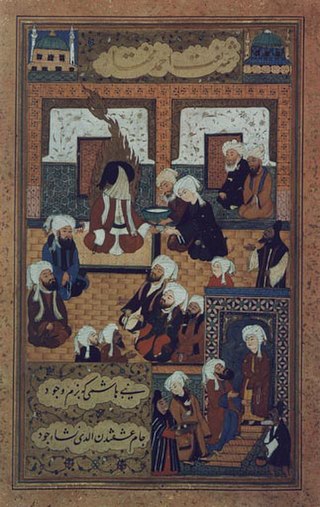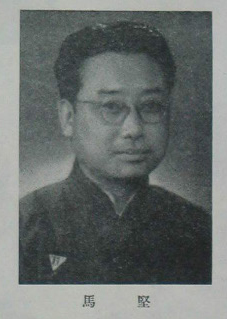
Allah is the common Arabic word for God. In the English language, the word generally refers to God in Islam. The word is thought to be derived by contraction from al-ilāh, which means "the god", and is linguistically related to the Aramaic words Elah and Syriac ܐܲܠܵܗܵܐ (ʼAlāhā) and the Hebrew word El (Elohim) for God.

The Quran, also romanized Qur'an or Koran, is the central religious text of Islam, believed by Muslims to be a revelation from God. It is organized in 114 chapters which consist of individual verses. Besides its religious significance, it is widely regarded as the finest work in Arabic literature, and has significantly influenced the Arabic language.
Abū Jaʿfar Muḥammad ibn Jarīr ibn Yazīd al-Ṭabarī, commonly known as al-Ṭabarī, was a Sunni Muslim scholar, polymath, historian, exegete, jurist, and theologian from Amol, Tabaristan, now in present-day Iran. Among the most prominent figures of the Islamic Golden Age, al-Tabari is widely known for his historical works and expertise in Quranic exegesis, and has been described as "an impressively prolific polymath". He authored works on a diverse range of subjects, including world history, poetry, lexicography, grammar, ethics, mathematics, and medicine. Among his most famous and influential works are his Quranic commentary, Tafsir al-Tabari, and historical chronicle, Tarikh al-Tabari.
Abu al-Fida Isma'il ibn Umar ibn Kathir al-Dimashqi, known simply as Ibn Kathir, was an Arab Islamic exegete, historian and scholar. An expert on tafsir, tarikh (history) and fiqh (jurisprudence), he is considered a leading authority on Sunni Islam.

The Companions of the Prophet were the disciples and followers of Muhammad who saw or met him during his lifetime, while being a Muslim and were physically in his presence.
Abu Muhammad Abd al-Malik ibn Hisham ibn Ayyub al-Himyari, known simply as Ibn Hisham, was a 9th-century Muslim historian and scholar who is known for editing the biography of Islamic prophet Muhammad written by Ibn Ishaq. He grew up in Basra, in modern-day Iraq and later moved to Egypt.

Ibn Hazm, was a Sunni Muslim polymath, historian, traditionist, jurist, philosopher, and theologian, born in the Córdoban Caliphate, present-day Spain. Described as one of the strictest hadith interpreters, Ibn Hazm was a leading proponent and codifier of the Zahiri school of Islamic jurisprudence, and produced a reported 400 works, of which only 40 still survive. In all, his written works amounted to some 80,000 pages. Also described as one of the fathers of comparative religion, the Encyclopaedia of Islam refers to him as having been one of the leading thinkers of the Muslim world.
Islamic military jurisprudence refers to what has been accepted in Sharia and Fiqh by Ulama as the correct Islamic manner, expected to be obeyed by Muslims, in times of war. Some scholars and Muslim religious figures describe armed struggle based on Islamic principles as the Lesser jihad.
Abū Muḥammad ʿAbd Allāh ibn Muslim ibn Qutayba al-Dīnawarī al-Marwazī better known simply as Ibn Qutaybah was an Islamic scholar of Persian descent. He served as a judge during the Abbasid Caliphate, but was best known for his contributions to Arabic literature. He was an Athari theologian and polymath who wrote on diverse subjects, such as Qur'anic exegesis, hadith, theology, philosophy, law and jurisprudence, grammar, philology, history, astronomy, agriculture and botany.
The history of the Quran, the holy book of Islam, is the timeline and origin of the written compilations or manuscripts of the Quran, based on historical findings. It spans several centuries, and forms an important major part of the early history of Islam.

Muhammad Ma Jian was a Hui-Chinese Islamic scholar and translator, known for translating the Qur'an into Chinese and stressing compatibility between Marxism and Islam.
Miguel Asín Palacios was a Spanish scholar of Islamic studies and the Arabic language, and a Roman Catholic priest. He is primarily known for suggesting Muslim sources for ideas and motifs present in Dante's Divine Comedy, which he discusses in his book La Escatología musulmana en la Divina Comedia (1919). He wrote on medieval Islam, extensively on al-Ghazali. A major book El Islam cristianizado (1931) presents a study of Sufism through the works of Muhyiddin ibn 'Arabi of Murcia in Andalusia. Asín also published other comparative articles regarding certain Islamic influences on Christianity and on mysticism in Spain.

Islam is an Abrahamic monotheistic religion centered on the Quran and the teachings of Muhammad, the religion's founder. Adherents of Islam are called Muslims, who are estimated to number approximately 1.9 billion worldwide and are the world's second-largest religious population after Christians.

The first to criticize the Islamic prophet Muhammad were his non-Muslim Arab contemporaries, who decried him for preaching monotheism, and the Jewish tribes of Arabia, for what they claimed were unwarranted appropriation of Biblical narratives and figures and vituperation of the Jewish faith. For these reasons, medieval Jewish writers commonly referred to him by the derogatory nickname ha-Meshuggah.
Tāj al-Dīn Abū al-Fath Muhammad ibn `Abd al-Karīm ash-Shahrastānī, also known as Muhammad al-Shahrastānī, was an influential Persian historian of religions, a historiographer, Islamic scholar, philosopher and theologian. His book, Kitab al–Milal wa al-Nihal was one of the pioneers in developing an objective and philosophical approach to the study of religions.
Emilio García Gómez, 1st Count of Alixares was a Spanish Arabist, literary historian and critic, whose talent as a poet enriched his many translations from Arabic.
Ibn al-Qūṭiyya, born Muḥammad Ibn ʿUmar Ibn ʿAbd al-ʿAzīz ibn ʾIbrāhīm ibn ʿIsā ibn Muzāḥim, also known as Abu Bakr or al-Qurtubi, was an Andalusian historian and the greatest philologist at the Umayyad court of caliph Al-Hakam II. His magnum opus, the History of the Conquest of al-Andalus, is one of the earliest Arabic Muslim accounts of the Islamic conquest of Spain.
Yūsuf ibn ʿAbd Allāh ibn Muḥammad ibn ʿAbd al-Barr, Abū ʿUmar al-Namarī al-Andalusī al-Qurṭubī al-Mālikī, commonly known as Ibn ʿAbd al-Barr was an eleventh-century Maliki scholar and Athari theologian who served as the Qadi of Lisbon. He died in December 2, 1071 (aged 93).
The postulation that Allah originated as a moon god first arose in 1901 in the scholarship of archeologist Hugo Winckler. He identified the name Allah with a pre-Islamic Arabian deity known as Lah or Hubal, which he called a lunar deity. The idea has been dismissed by scholars such as Patricia Crone and Joseph Lumbard, and is vehemently rejected by Muslims.

Maurice Gaudefroy-Demombynes was a French Arabist, a specialist in Islam and the history of religions.